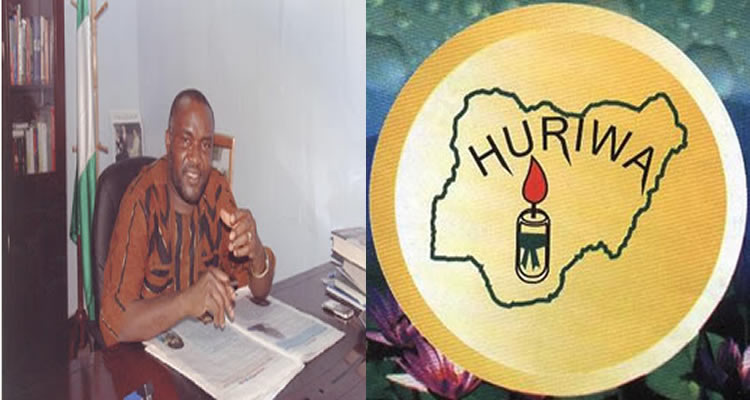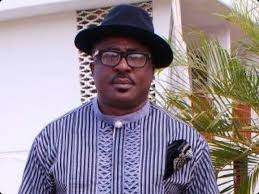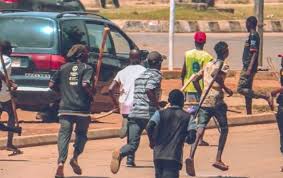*Applauds ITF Over High Ethical Standards:
A charge has gone to the independent corrupt practices and other affiliated crimes commission (ICPC) and the Code of Conduct Bureau (CCB) to wake up from institutional slumber and monitor the financial dealings of Local Government Councils in the country.
The prominent Non- Governmental and Civil Rights Advocacy Group:- HUMAN RIGHTS WRITERS ASSOCIATION OF NIGERIA (HURIWA) lamented that the apparent compromise or institutional lethargy by ICPC and CCB is responsible for the offensive scale of grand corruption at the local government councils especially regarding the operations of the states/local governments joint accounts.
Relatedly, the Rights group has applauded President Muhammadu Buhari for appointing a Director General for the Industrial Training Fund (ITF) Mr. Joe Ari that has manifested an uncommon exhibition of respect and strict adherence to ethical codes of conduct for public officials and transparency code in the running of that Federal agency.
The Rights group recalled that news report stated that the Director-General of the Industrial Training Fund (ITF), Joseph Ari, has lauded the Independent Corrupt Practices and other Related Offences Commission (ICPC) for ranking the ITF first for ethics compliance and integrity amongst 352 Federal Government Ministries, Departments and Agencies (MDAs).
The Rights group said the Mr. Ari in a press statement signed by the Director, Public Affairs Department, Suleyol Fred Chagu, said the commendation came as a result of the surveyed carried out by the ICPC in 2020. The statement said other MDAs that were equally considered to have displayed high compliance to integrity and ethics according to the Ethics Compliance and Integrity Scorecard (ECIS) of the Commission include, University of Maiduguri Teaching Hospital, Federal College of Education Kano, Nigeria Communications Commission (NCC) and Raw Materials, Research and Development Agency amongst others.
Speaking on the increasing scale of corrupt practices at the local government councils, the Rights group through the National Coordinator Comrade Emmanuel Onwubiko and the National Media Affairs Director Miss Zainab Yusuf, tasked both the ICPC and CCB to work out strategies for carrying out effective oversight of the financial transactions of the local government councils because according to the group, it is the collapsed state of social amenities at the Local Government Councils created by the total non- existence of good governance standards at that third tier of government that has made millions of Nigerian families absolutely poor.
“We believe that the ICPC and the CCB may be colluding with state Chief executives so the vicious circles of fraud, disappearances of local government allocations from the federation accounts have continued to expand in leaps and bounds just as it noted that rural poverty which results from local governments’ deeply entrenched political corruption has become a grave threat to national security which must be checked by the institutions set up to inculcate and enforce laws on transparency and accountability in public offices. HURIWA stated that THERE is absolutely no need for President Muhammadu Buhari to issue an executive order to bring into being the financial autonomy of the third tier of government had it been that both the ICPC and CCB were up and doing with their statutory mandate of fighting corruption of all ramifications.
“We wonder why the ICPC and the code of conduct Bureau have both become miserable toothless bulldogs that stand by whilst the common wealth belonging to the citizens at the grassroots are stolen by governors and their foot solders posted like colonial tax collectors by governors to their local government councils against section 7 of the constitution and democratization of local council. Specifically, section 7 of the 1999 constitution states thus:Local Government System(1) The system of local government by democratically elected local government councils is under this Constitution guaranteed; and accordingly, the Government of every State shall, subject to section 8 of this Constitution, ensure their existence under a Law which provides for the establishment, structure, composition, finance and functions of such councils.”
HURIWA said the reason for the governors violating section 7 of the 1999 Constitution was to enable them post their boys and mistresses as administrators to continue to perpetuate the continuous heist of the council funds and they are getting away with these crimes against humanity because the institutions of ICPC and CCB that should effectively check and stop the financial leakage may be benefiting from the financial bonanza.
HURIWA stated that Code of conduct bureau Act in Section 2 and 3 of code of conduct Bureau authorised the effective monitoring of finances of local councils thus: “Section 2. Aims and objectives of the Bureau
The aims and objectives of the Bureau shall be to establish and maintain a high standard of morality in the conduct of government business and to ensure that the actions and behaviour of public officers conform to the highest standards of public morality and accountability. Section 3. Functions of the Bureau
The functions of the Bureau shall be to‐
(a) receive assets declarations by public officers in accordance with the provisions of this Act;
(b) Examine the assets declarations and ensure that they comply with the requirements of this Act and of any law for the time being in force;
(c) Take and retain custody of such assets declarations; and
(d) Receive complaints about non‐compliance with or breach of this Act and where the Bureau considers it necessary to do so, refer such complaints to the Code of Conduct Tribunal established by section 20 of this Act in accordance with the provisions of sections 20 to 25 of this Act:
Provided that where the person concerned makes a written admission of such breach or non‐ compliance, no reference to the Tribunal shall be necessary.”
Besides, HURIWA said the law empowers ICPC to eradicate Local Councils grand scale corruption by virtue of the enabling law in Section 6 (a-f) of the ICPC Act 2000 sets out the duties of the Commission as paraphrased in the following: “a) To receive and investigate complaints from members of the public on allegations of corrupt practices and in appropriate cases, prosecute the offenders.
b) To examine the practices, systems and procedures of public bodies and where such systems aid corruption, to direct and supervise their review.
c) To instruct, advise and assist any officer, agency, or parastatal on ways by which fraud or corruption may be eliminated or minimized by them.
d) To advise heads of public bodies of any changes in practice, systems or procedures compatible with the effective discharge of the duties of public bodies to reduce the likelihood or incidence of bribery, corruption and related offences.
e) To educate the public on and against bribery, corruption and related offences.
f) To enlist and foster public support in combating corruption.”





